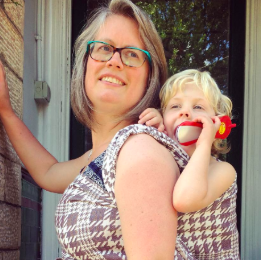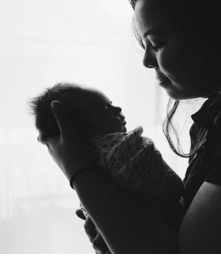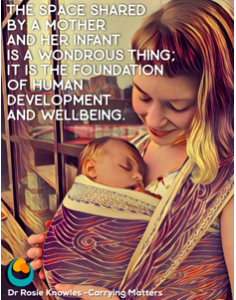We are delighted to publish this informative article written by Dr Rosie Knowles, a practising GP (UK) and author of the book, ‘Why Babywearing Matters?’ She has a special interest in holistic medicine as well as children and women’s health and perinatal and infant mental health.

Infant mental health matters. Every adult was once a small infant, vulnerable and dependent on the caregivers around them. This early part of a child’s life sets the stage for their long-term future.
Our society is gradually becoming more aware of how important it is to provide a good start in life for children.
There is an increasing number of campaigns promoting mental health support in schools for children and teenagers, beginning at primary school, which is a good thing to provide.
However, a child’s life does not begin when they start school; their psychological wellbeing (their mental health) begins much earlier.

Babies’ brains begin to develop in utero. At birth, a baby’s brain has all the neurons (brain cells) it will ever have.
The next few months and years determine how these neurons form connections; creating a network that helps a child to understand the world around them.
Babies can feel; they have emotions, they are learning to relate to the world around them and communicate from their earliest weeks.
The first 1001 days is a key stage
The first 1001 days of a baby’s life (approximately the first three years) is a key stage of growth and development, and it is the point at which a child’s brain is shaped most significantly by the environment around them and the experiences they have.
In the first few years, more than a million neural connections form every second, and connection that is used again and again become “sticky”, and pathways begin to develop.
The “serve and return” theory of brain growth explains how these connections shape the brain.
A baby “serves” and waits to see if the parent returns the ball. If the ball comes back, a baby has learned that their action has created a reaction.
Babies are scientists; testing the world around them to see what happens and to gain an understanding of how it works and how they can fit into it.
I have described this process to the parents I work with as a form of road map development.
At the start, pathways may be small and overgrown, like a jungle of hanging tendrils crisscrossing everywhere. However, as more messengers travel along the same path, backwards and forwards, the way becomes wider and clearer due to frequent use, and the messengers can travel more quickly.
If the messengers stop using this road, gradually it will become overgrown again and eventually, it will vanish (this is part of natural brain shaping later in life).
But with consistent and regular use, the path becomes a bridleway, then it becomes a road.
As the amount of traffic continues to increase along this path, eventually it becomes a paved road, then an A road; and finally a motorway and ultimately, a superhighway. It is almost as if a “groove” has been created; using this connection constantly has shaped the brain for messages to travel instantly.
A baby whose needs are consistently met comes to know that the people who love them will respond to their calls.
They have developed a “groove” of trusting and calm connection when something doesn’t feel right; as opposed to a groove of fearful loneliness flooded with stress and adrenaline.
Overall consistency is key, not perfection, especially during this period of rapid brain growth.
This is reassuring; as it reminds parents that if some messages go awry, or if their response to the baby’s action is not always consistent, these highways don’t instantly revert back to the jungle.

Babies brains grow and change depending on the environment around them.
Dr Bruce Perry says that an infant’s brain develops in a sequential and “use-dependent” fashion (The Boy Who Was Raised As A Dog).
His works describe what happens to children when key stages of normal brain development are missing; these areas of the brain have not matured and it has had a long term effect on that child’s life.
He makes it very clear that brains are programmed to develop in a certain order, being built from the bottom up, and if the foundations of brain architecture are disrupted by chronic stress or trauma, this will have a very significant impact.
You can read more about the effects of “adverse childhood experiences” and the need for a “trauma-informed” approach in the links below.

This can be a scary concept to consider; the sheer weight of responsibility to build a baby’s brain optimally, especially when new parenthood is hard and exhausting. Knowledge can be burdensome when it isn’t matched with support and useful tools.
Fortunately for us, babies and their parents have evolved alongside each other and are perfectly placed to meet each other’s needs, in normal, healthy circumstances.
Perry points out that it is the quality of relationships around a child that ultimately determines their long term future, not their “ACE score” (which should never be used for an individual assessment by anyone other than a trained professional who can also offer resources for healing there and then).
Children are more than just their trauma and should always be viewed holistically and positively, focusing on the advantages and assets they have, not just their disadvantages and deficits.
The more healthy relationships a child has, the more likely he will be to recover from trauma and thrive. Relationships are the agents of change and the most powerful therapy is human love. – Bruce Perry
When a baby is born, so is a mother.
Babies and mothers come as a unit; a dyad. When babies and their mothers are given the space and support they need from the society around them and encouraged to be together as their instincts guide them, they will grow together and thrive.
Close loving contact builds a mutually reciprocal relationship; the chemistry of cuddles working in the background to knitting the dyad together.

Good mental health for a mother and for her baby begins long before the baby is born.
Antenatal anxiety and depression and other mental health challenges are very common and there is much less awareness about this compared to postnatal issues.
Perinatal mental health is still underfunded and not enough attention is paid to this crucial part of women and their partners’ lives.
Failing to invest properly in perinatal mental health is thought to bring a “total economic and social long-term cost to society of about £8.1 billion for each one-year cohort of births in the UK.”
That is a staggering amount of money, every year, much of which could have been saved by focusing on prevention and early intervention.
Being able to feel safe with other people is probably the most important aspect of mental health; safe connections are fundamental to meaningful and satisfying lives.
Bessel van der Kolk pointed this out in his book “The Body Keeps the Score” and it seems so obvious; mothers and the primary caregivers around a child are the sources of safety and security in the normal course of events.
Anything that disrupts this is going to have a long-lasting and negative impact.
If mothers are not well, if they are not supported, they and their children, and society will all suffer together.
For infants to thrive, mothers must thrive too.
James Heckman points out that investing in early childhood development is well worth it, from both a sociological and economic perspective.
The highest rate of return in early childhood development comes from investing as early as possible, from birth through age five, in disadvantaged families.
Starting at age three or four is too little too late, as it fails to recognise that skills beget skills in a complementary and dynamic way. Efforts should focus on the first years for the greatest efficiency and effectiveness. The best investment is in quality early childhood development from birth to five for disadvantaged children and their families. – James J. Heckman
When you combine not investing in perinatal mental health, and not investing in early childhood development, the long term cost to society is staggering.
This has to change.
So what can we do? How can we encourage healthy brain development for our children and ensure their mothers and other caregivers are given the support they need?
Ultimately, this needs a change at the political and social level; a change in focus and a recognition that investment is worth it.
– Write to your MP, your local hospital, your local health visiting service, demanding better care for mothers and their babies.
– Talk to the parents and health professionals you meet.
– Encourage early years child care providers to offer trauma-informed care.
– Be more aware of the mothers and caregivers in your social circle; do they need support?
– Share information about perinatal and infant mental health widely.
– Be part of a paradigm shift that values infants and their mothers and carers fully.
Gentle and responsive parenting builds a happy brain, creating a healthy positive inner thought state that affects long term mental health.
Furthermore, building resilience by creating stable, reliable relationships helps to combat the effects of adversity that so many children experience.
Researchers such as Michael Meaney are further advancing our understanding of the influence of the social environment on genomic structure and function.
* Be a responsive parent.
When your baby cries, pick them up and comfort them, knowing that you are helping their brain to develop in positive lines.
You’re building a secure foundation for them; helping them to build a sense of belonging and being valued.
* Hold your baby; give them the gift of soft touch and cuddles.
The close contact of soft touch (holding, stroking, massage, rocking) is an essential part of building a social brain and a secure attachment (that later encourages confidence exploring).
Our human instincts are strong (a baby’s cry tugs at our heartstrings and we feel the urge to gather them up, hold them close and rock gently while murmuring in a soothing way).
We are discovering much of the neurochemical science behind this normal, natural behaviour; the chemistry of cuddles.
Oxytocin release builds a loving connection via multiple pathways.
Soft touch has helpful effects on the hypothalamic-pituitary-axis and cortisol production, reducing pain and modulating the stress response via epigenetic changes (the work of Francis McGlone.)
Don’t be afraid to cuddle your baby often; you are helping to build a happy brain.
Comments such as “put that baby down, you’re building a rod for your own back” are inaccurate and not based on any scientific evidence.
Securely attached children with happy brains are worth building!
*Try a baby carrier.
A comfy baby carrier will give baby plenty of close contact and soft touch, in a safe space, building a secure attachment.
It recreates in some part the intra-uterine environment of warmth and safety and containment (the 4th trimester period) and allows babies to feel safe and secure.
From this place of confident trust, they can use their energy to develop new skills and engage with the world.
You will have your hands free to live your life and do the things that you need to, for your own mental and physical health.
Your local sling library can help you find one that fits you both, is safe and is comfortable (no baby carrier should be uncomfortable; if it is, it doesn’t fit right).
Read some more in-depth discussions about the positive effects of babywearing here.
*Talk to your baby, smile, laugh and play with them. Engage in plenty of eye contact, and respond encouragingly to their attempts to communicate.
This helps them learn about the world and their relationship with you.
You’re helping them to build a sense that they are lovable and precious to you, providing them with an intrinsic motivation to keep going with developing their new skills.
*Recognise your baby as a person with feelings and emotions; young infants do not have the cognitive skills to manipulate.
Babies can become overtired and upset; this is due to their immature brains, not a rejection of you.
Babies do not cry to be annoying, but to express their distress and ask for help.
Parenting a tiny person can be hard work; don’t do it alone.
*Look after your own mental health, and get some support.
This is absolutely essential; your own health and wellness is key to being able to be a responsive parent.
If you need a break for a few minutes, put your baby down somewhere safe and take the pressure off.
Surround yourself with as much support as you can, and ask for it if it’s not obvious.
Take the first step of talking to another parent; they may be feeling just the same as you and you can then encourage each other. Find encouraging communities; real ones if you can, online too.
* Believe that you matter too; if you are a mother if you are a father if you are a caregiver. You are an essential part of the family unit and you will thrive best when you all try to work together.
Your baby does not need a perfect parent or carer; your baby needs a loving, well-supported caregiver.
It is a learning curve; a journey you travel together, mostly heading in the right direction.
You don’t need to get it right all the time, your baby’s brain will not revert back to jungle because you all have bad days.
Be gentle with yourself; you are learning too! You are learning how to be a parent or carer right alongside your baby.

Further reading
Bruce Perry – The Boy Who Was Raised As A Dog
Bessel van Der Kolk – The Body Keeps the Score
Harvard Center on the Developing Child resources
The Unicef Relationship Building resources
The CDC Adverse Childhood Experiences study
Trauma-Informed Approaches to Mental Health in the UK
Maternal Depression Can Undermine the Development of Young Children
The Future of Healing: Shifting From Trauma-Informed Care to Healing Centered Engagement
We need to talk about children’s mental health – Dr Elizabeth Gregory
International Forum for Wellbeing in Pregnancy website
Association for Infant Mental Health
Children’s Mental Health Week with the Place2Be
Babywearing for Foster and Adoptive Parents
Building Bonds Project – a group that recognises the importance of building early positive connections within families at times of disadvantage and crisis and donates slings and carriers.
Acknowledgement
Republished here with thanks to Dr Rosie Knowles, from the original article.

